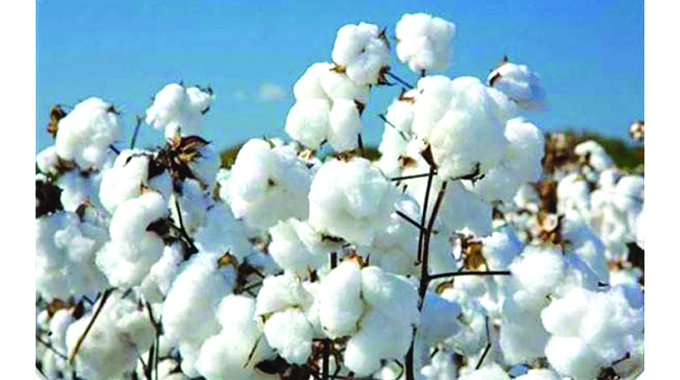Pfumvudza targets 370 000ha of cotton

Conrad Mupesa Mashonaland West Bureau
AT least 3 700 tonnes of cotton planting seed has been distributed to farmers since October this year under the Presidential climate proofed smart agriculture, Pfumvudza/Intwasa, enough to plant more than 370 000 hectares.
Cottco Zimbabwe’s acting accounting officer Mr Munyaradzi Chikasha said the early disbursements were in line with ensuring that farmers realised good yields.
Many cotton farmers last season lost potential high yield output due to late planting that saw their crop spilling into winter without splitting the bolls to produce the white fluffy material.
Said Mr Chikasha: “We have disbursed 3 720 tonnes of cotton planting seed since October under Pfumvudza concept. We also distributed over 80 000 tonnes of Compound L fertiliser under the same concept.
“The inputs distributed translate to 372 800 hectares that we have contracted to date and we have enough inputs to support all farmers. It is our fervent target that our farmers plant earlier so that they are not affected by the winter cold spell.”
Cottco, he said, had also received at least 92 percent of the required basal fertiliser.
He warned farmers against selling this key input in cotton farming.
“We are better prepared for this season than most of the seasons, but we are faced with a challenge this year as farmers are selling fertiliser given under the scheme for free,” he said.
An investigation by this paper found that a bag of fertiliser was being sold by some farmers for a paltry US$6 after the buyer lied that cotton does not require compound fertiliser.
“Unscrupulous buyers from the city have resorted to going to the rural areas to buy the fertiliser at a give-away price,” said Mr Chikasha.
“Farmers are being misled that cotton doesn’t require basal fertiliser and let me hasten to say, that this is not true.
“Cotton requires basal fertiliser and the poor yield output of 300 to 400 kilogrammes that we have recorded annually, is as a result of farmers limiting feeding their crop with enough basal fertiliser.”
To enforce Government’s statutory instrument designed to prohibit selling and buying of inputs, the Zimbabwe Republic Police cracked the whip recently, arresting many that were prosecuted and sentenced for selling or buying Government-supplied fertiliser.
The country is targeting at least 800kg per hectare from the open pollinated variety, while the hybridised seeds like Mahyco are expected to increase the yield output to above 2000kg/ha.
In Mashonaland West, distribution of the cotton inputs is at 50 percent, with Chinhoyi business unit manager Mr Claudius Kanhema saying hard to reach areas were given the first preference for delivery.









Comments